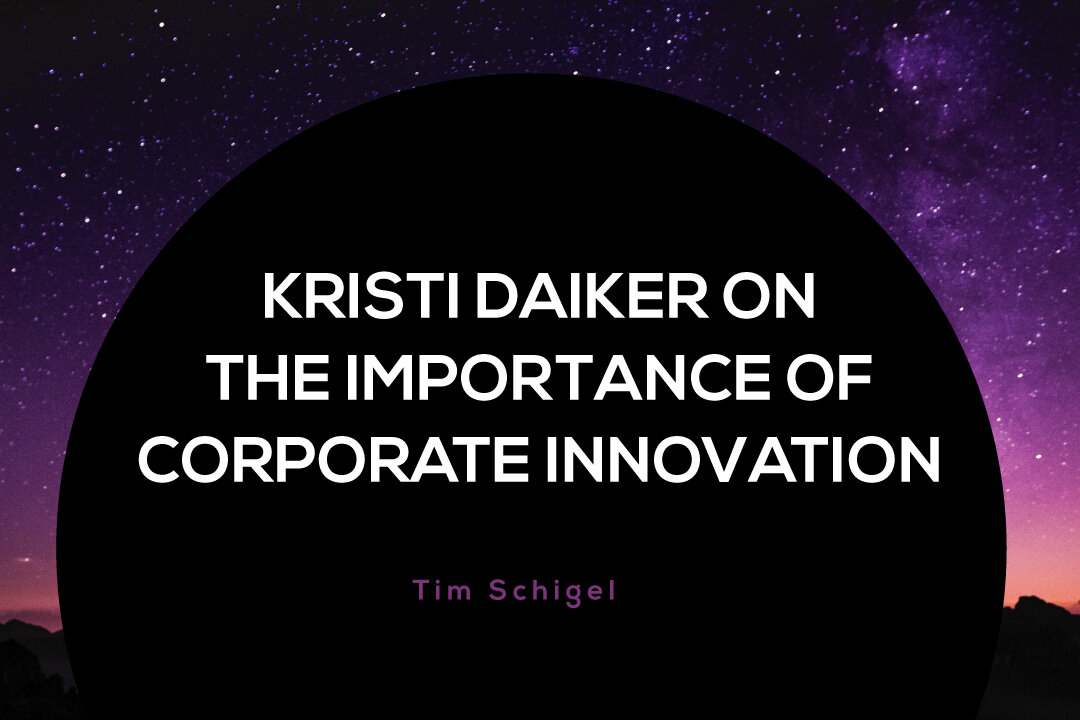We recently sat down with Kristi Daiker, one of our venture partners, and spoke about the importance of corporate innovation. Kristi spent 20 years working for Cardinal Health, a prominent medical wholesaler within the United States and internationally.
Her innovative mindset comes from working there—they’ve been through many acquisitions, and she has seen Cardinal Health grow over the years. After that, she went on to work with startups, successfully build new businesses, launch new technologies, and has helped many companies grow their revenue, turn their operations around, and enable business strategies. Today, she helps companies fulfill their visions and achieve their desired strategic and operational business objectives.
We started by talking about what she thinks are the most significant cultural tenants that a company must have to foster corporate innovation.
Kristi recalled her days at Cardinal, where they often changed leadership, and according to her, “a big piece is having the autonomy to solve problems.” She talked about how Cardinal believed in and supported their employees, especially if they wanted to try a new role.
“Belief in the people, and thinking differently, outside the core, has always been important. But you should always stay true to the core capabilities too. Don’t deviate so far that you put business at risk, but deviate enough that you can really do something incredible,” she said.
She discussed how at Cardinal, innovation was one of the values that they tried to drive and how organizations should leverage partnerships and outside thinking (like they did). “Really having belief in your teams, but thinking how to do it together—is not just a solo job.”
For Kristi, leaders need to make sure that they’re encouraging innovation, not blocking it.
“I think you have to really be disciplined, too,” said Kristi. “Be open to ideas, seek input from folks that you trust, who could bring a different perspective. If you’re trying to address something internally, maybe step outside of your core group and get somebody’s different perspective, somebody that’s trusted and that you can lean on. Encourage the team, even during the hectic times, to really think about this differently,” she said before explaining how leaders can do this.
She also gave us some insight on getting teams to embrace change. Many people get anxiety because of change and ask questions like, “What will be the impact on me?” Kristi suggests making people feel like they are part of the change and knowing their role or what it could be. “I think being very transparent with the team, letting them know what their role is and why they’re important,” she said.
One challenge that people face is getting others to see that innovation leads to growth—not always just corporate development, but personal growth. If you’re struggling with this, Kristi believes in using examples from outside sources that are similar to what you’re trying to do. They should also have reassurance and support throughout the whole process. “I think we need to tell folks, ‘Hey, we’re not going to get this right. It’s not going to be the perfect journey. So, we’re going to have to be really flexible and able to adapt as needed,’” she said.
We need to adapt and be flexible, but it can be hard to get people to realize that if we don’t change and evolve, we stagnate. We talked about how quickly things changed in 2021 and how, sometimes, things generally thought to be adverse, like the pandemic, can drive innovation.
With the pandemic, many people started working from home, and we all adopted and figured out different systems. For example, the healthcare industry had to shift to telemedicine almost overnight.
As Kristi explains, “There were rules that have been placed because they had always been that way. And now, with the pandemic, we have to relax on those rules. But we’re able to still keep the integrity of whatever the rule was trying to enforce. You have to show people that through change, good can come out of it.”
When things like a pandemic happen, it’s an opportunity to teach people that they can achieve things but may not realize it. “People will say, ‘I’m not good at change.’ Well, look how well you’ve survived through this pandemic,” said Kristi.
Other than telemedicine, the pandemic has contributed to many instances of corporate innovation. It has forced people to see things outside of their usual focused area and leverage resources more. By working remotely, people have more freedom to be where they want to be to get work done, which allows them to work more efficiently and be more productive. Kristi is certain that there are many changes that people were slow to make, even in things like managing their kids and families, that changed because of the pandemic.
Interestingly, the pandemic has also helped people discover a different, more personal type of innovation; for example, some become more aware of their mental health. They started thinking differently, thinking of ways to reach people, solve their problems, and make new opportunities for them.
Corporate innovation is key for established corporations and startups; interestingly, both types of businesses can have a symbiotic relationship and learn from each other. Established corporations can invest in startups and help them using their experience, and in doing so, they can learn a lot from the startups.
“Corporations tend to be slow and bogged down. And you need to be able, when working with them, to help bring a fresh way of doing things, help them challenge how they’ve done stuff, and be able to get them to take a step back. Ask them questions about why it works in a certain way, and does it need to work that way?” explained Kristi.
Working with both corporations and startups, Kristi has seen many similarities where they can connect and how they can leverage the strengths of one another. Most corporations recognize the importance of innovation but just aren’t talking about it; but they recognize it when they seek outside perspective.
“Once a corporation becomes slow and bogged down, it’s really hard for them to change,” explained Kristi. “If you want to think innovatively, sometimes you have to separate that group from the corporation to untether them from certain bureaucratic processes and steps.”
Some corporations have old ways of thinking, such as “Everyone needs to be in the office for us to be able to do our work,” even if they won’t even talk to each other in the office.
That isn’t the case for Kristi. “I know you’re going to get the job done; I don’t need you here in the office five days a week. If you need to take a day or two at home because you’re managing work and your life, and you’re able to get your job done, if it’s keeping you focused on work and in life, that’s all that matters.”
We concluded by talking about what that means for venture capital. Kristi believes that VC companies can teach corporations how to be even more entrepreneurial, work with them to find their goals around innovation, their strategies, and help them implement them.
Large corporations usually have a lot of business-minded folks who know how to manage operations with startups. If they have a great idea and they’re just firing it off and getting it developed, it might help to pair them up with a VC company that can help them develop it further.
“The corporation is going to get more value out of their investment,” explained Kristi. “You’re going to be able to manage your money by doing that, and you have a better chance of success, but you’re also developing your people—they’re learning a new way of thinking. So, they’re going to come back and work in your company and bring that way of thinking, that’s just going to help and cascade to other people that they get to work with. It feels like such a win-win experience.”



